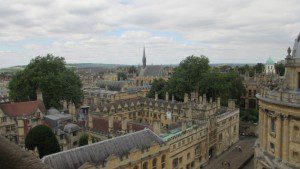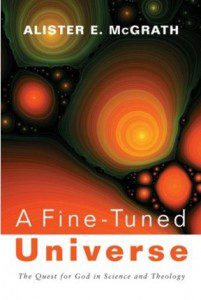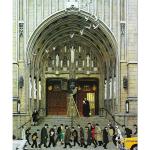 Alister McGrath is the Andreas Idreos Professor of Science and Religion at Oxford University. With a Ph.D. in molecular biophysics and extensive study in theology, including an additional doctorate or two, he is well qualified to speak on the subject of science and Christian faith. book A Fine-Tuned Universe: The Quest for God in Science and Theology digs into the question of natural theology from a twenty-first century perspective. How do we find God in what we know and see? This book is an enlarged version of his 2009 Gifford Lectures in which McGrath examines the evidence for and interpretation of fine-tuning in the universe. You can find the texts of his lectures online along with the PowerPoint slides used in the talks.
Alister McGrath is the Andreas Idreos Professor of Science and Religion at Oxford University. With a Ph.D. in molecular biophysics and extensive study in theology, including an additional doctorate or two, he is well qualified to speak on the subject of science and Christian faith. book A Fine-Tuned Universe: The Quest for God in Science and Theology digs into the question of natural theology from a twenty-first century perspective. How do we find God in what we know and see? This book is an enlarged version of his 2009 Gifford Lectures in which McGrath examines the evidence for and interpretation of fine-tuning in the universe. You can find the texts of his lectures online along with the PowerPoint slides used in the talks.
CS Lewis is quoted as saying “I believe in Christianity as I believe that the Sun has risen, not only because I see it, but because by it I see everything else.“
This quote provides a theme for McGrath’s understanding of Natural Theology and his understanding of fine-tuning in the universe. There are two related questions he addresses.
Is it reasonable to suggest that the universe was designed for our existence?
What theological conclusions can we draw from the nature of the universe we see?
 Before delving into fine-tuning and the nature of the universe it is useful to consider what natural theology is and what natural theology is not – at least according to McGrath.
Before delving into fine-tuning and the nature of the universe it is useful to consider what natural theology is and what natural theology is not – at least according to McGrath.
Natural theology is not a “proof” for the existence or nature of God. The Enlightenment project attempting to find an objective basis for belief in God must be considered a misguided failure. McGrath highlights three specific aspects of this failure.
- Objective rational certainty is unattainable. The rise of postmodernism has led to a realization that much of the ideal of 18th and 19th century natural theology was intimately connect to modernist thinking. But much of what was regarded as universal and necessary is now seen to be local and contingent – certainly interpretation is influenced by social and historical factors.
- Observation of nature alone is not enough. The idea that observation of nature alone can provide a foundation for reliable knowledge of the triune Christian God has been tried and found wanting. While nature can point to God, reliance on nature alone leads to heterodox notions of God. More than this “Nature many now argue, is religiously ambivalent, leading as much to a natural atheology as to a natural theology. Writers such as Dawkins and Daniel Dennett have produced … [treatises] … advocating a natural atheism (or atheology). (p. 18) Science becomes, in the hands and minds of some, a weapon against faith.
- We must rely on God’s revelation. Finally, following the writings of Barth, natural theology as a foundation for faith undermines the importance of God’s self-revelation in scripture and in Christ. In fact it represents a desire to assert human autonomy and control over our relationship with God.
If knowledge of God can be achieved independently of God’s self-revelation in Christ, then it follows that humanity can dictate the place, time, and means of its knowledge of God. … The human desire to assert itself and take control over things is seen by Barth as one of the most fundamental sources of error in theology, leading to the erection of theological towers of Babel – purely human constructions erected in the face of God. (p. 19)
But all of these criticisms of natural theology are really criticisms of natural theology as proof for the existence of the Christian God. They do not undermine all aspects of natural theology.
Reclaiming a vision for natural theology. According to McGrath we can develop a useful and workable natural theology – but within limits.
natural theology … is best interpreted as an attempt to find common ground for dialogue between the Christian faith and human culture, based on a proposed link between the everyday world of our experience and the transcendental realm – in the case of the Christian faith, with the “God and Father of our Lord Jesus Christ” (1 Peter 1:3). It represents an “intertwining of knowledge and belief,” two habits of thought that are often seen as antithetical in the twenty-first century yet actually have the potential for creative convergence. (p. 5)
And later
Natural theology is therefore best understood as the enterprise of engaging and interpreting nature on the basis of the fundamental beliefs of the Christian tradition. It is the way of seeing nature that is made possible and made appropriate by the Christian faith. … One cannot therefore speak meaningfully of natural theology “proving” God’s existence; it is, however, entirely appropriate to speak of a “resonance” between theory and observation, in which it is confirmed that the fundamental themes of the Christian faith offer the best explanation of what is seen. (p. 20)
Natural theology helps us make sense of the world in which we live, it helps us see and understand God’s mission and power.
What is your opinion? Is natural theology a worthwhile endeavor? What theological conclusions can we draw from the nature of the universe we see?
If you wish to contact me directly you may do so at rjs4mail [at] att.net.
If interested you can subscribe to a full text feed of my posts at Musings on Science and Theology.
















